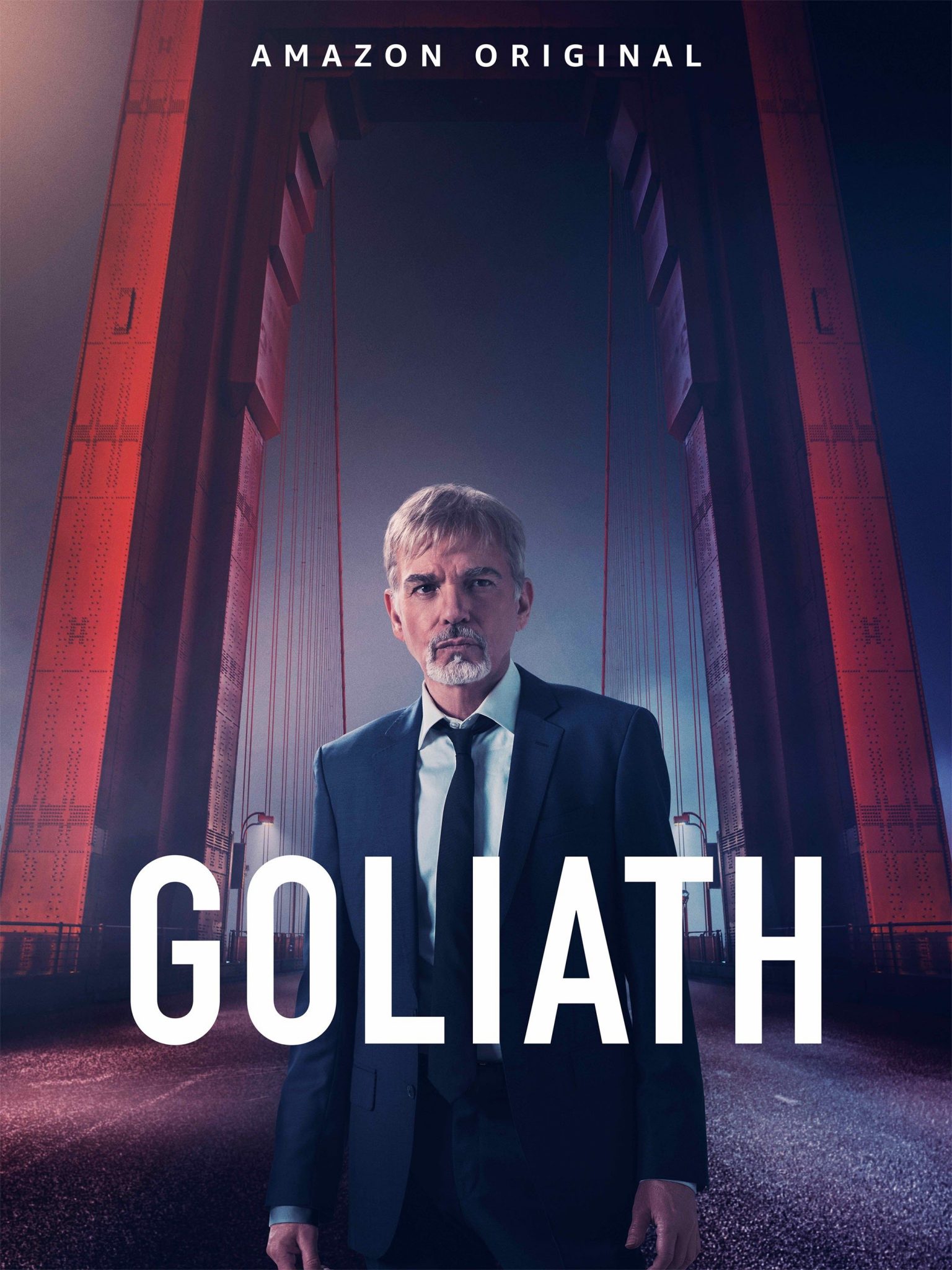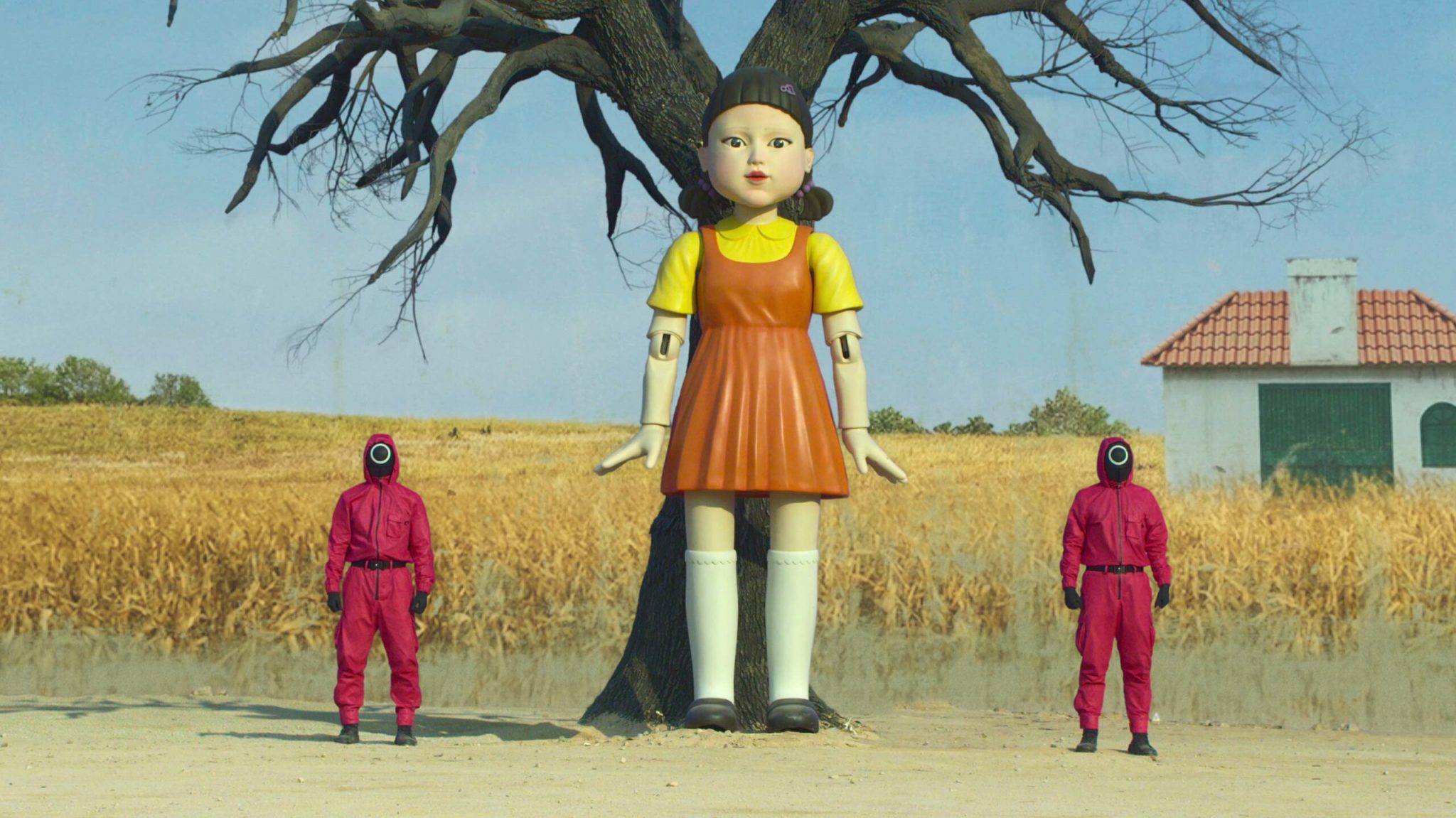Watercooler Wednesdays: Goliath & Squid Game
Watercooler Shows, the trending series that everyone talks about the next day at the office, around the water cooler… today there are no longer offices to go to, the movie theaters are functioning at limited capacity, and the content on the streaming platforms is increasing exponentially. Watercooler Wednesdays seeks to be a (critical) guide through the VoD maze: from masterpiece series to guilty pleasures, and from blockbusters that keep you on the edge of your couch to hidden gems; if it leads to binging, then it’s exactly what we’re looking for.
A Hollywood courtroom drama (Goliath) and some Asian hyper-stylized violence (Squid Game, of course)… what unites this month’s recommendations, which could not be more different from each other, is that none of them would have been my first choice. I avoided them simply because they seemed more of the same, the same recipe perhaps well-executed – in the case of the first one -, as for the second, I had already heard so much about it that I had no curiosity left, just a feeling of dissent towards the marketing tactics.
The binging ends with a mixed conclusion: the last season of Goliath completely hijacked my watchlist of series, in the sense that the first three seasons of Goliath made it to the very top of the list; and Squid Game is actually pretty good, but not for the reasons it went viral.

Goliath (David E. Kelley, Jonathan Shapiro, 2021)
Casting directors call him whenever they need an asshole, declared Billy Bob Thornton some time ago. In Goliath, however, he plays a good guy, not even an antihero, despite his biography: Billy McBride, an alcoholic lawyer, who lights cigarette after cigarette, with a few minutes of clinical death under his belt (a trauma he brings here from the previous season) and serious attachment issues (a living daughter who doesn’t speak to him, and a father who keeps sending him messages from beyond in his dreams).
Goliath‘s trailer almost made me not watch the series – it was also because of the title, which seems very much like the first-hand choice for a story of this kind: a rogue lawyer who fights the big pharma behind the opioid epidemic (in each of the four seasons, the format is the same, a man against the corporate hydra). Actually, the trailer made me watch the series even though I wasn’t set on it. And that’s because the narrative seemed taken out directly from the Paleolithic of TV series (legal dramas are probably the most prolific dinosaur on the small screen, along with the series about doctors and cops). And, what do you know, it turned out to be exactly so – including the classic uplifting and highly naive speeches in the courtroom – not to mention the procedural solutions which were quite predictable.

Only that the narrative isn’t the most important thing here. On the path between investigation and court, it turns out that Goliath is a full-fledged idler: it wanders atmospherically through endless and far-fetched rainfalls and melancholic neon lights in Chinatown (where the hero has his lair); out of love for cinema but without any agenda, it pulls all sorts of genres/tropes and references/tributes to classic works out of the hat (from musical to noir, a pastiche after Sergio Leone, a hint of Sin City, a remake close to Rear Window, which in turn is integrated into a city symphony inspired by Vertigo); and, most importantly, it lets its characters languish agonizingly in all sorts of situations vaguely tangent to the main plot, an occasion to render some memorable performances.

And thus we return to the trailer, a visual name-dropping, which doesn’t lay out all the above reasons why Goliath is worth our attention but rather convinces by presenting a hand of 4 aces (and at least a joker hidden in the sleeve). I would have probably said pass to Billy Bob Thornton, to J.K. Simmons too (villain, magnetic and evil, a CEO who made his fortune from legal drug trade), even to Bruce Dern, who seems to play the same role, that of a grumpy old man, in every movie (a mistake I won’t ever make again, and I could watch him play the same role over and over)… but I draw the line at Jena Malone. From Donnie Darko to Neon Demon, Jena Malone is always impeccable.

Here, Malone plays a character made out of only two coordinates, enough to heat things up: she is the heiress of a law firm that she tries to keep afloat and is diagnosed with MS (i.e. multiple sclerosis). Minimal drama, great inner tension: you have a few months to live, you need to leave something behind (the more pressing issue is that this something was left to you by someone else, so it wouldn’t only be a personal failure, but it would also lead to the disappointment of your family) and you try your best to walk the fine line between good and bad. The way this dramatic tension is wrapped in legal procedures is not the greatest, despite the creative force behind it: Jonathan Shapiro and David E. Kelley (lawyers, Harvard and Princeton graduates, the latter is also the only producer who managed to win in the same year the most important Emmy awards – drama and comedy – for two TV series about lawyers, The Practice and Ally Mcbeal).

But as I said at the beginning, the legal story and the plot twists are less important here. After the Nine Perfect Strangers fiasco, by the same tireless David E. Kelley, a series that couldn’t figure out what it wanted to say by the end, I wonder if it’s not intentional. You take a TV format to which the audience has grown accustomed, you throw in a minimal narrative structure (after all, everyone already knows the rules and has learned the legal slang) and some stars whom you can flaunt on the promotional materials… and in-house you go crazy: get Billy Bob to smoke endlessly at the window, a melancholic gif in which the concept of Rear Window overlaps with the atmosphere in Blade Runner; at the opposite window, a reply comes from Bruce Dern, a Dickensian Scrooge turned retiree in Chinatown, an old fuddy-duddy; in the basement of the building – in the all-too known local pub where lawyers spend their after-hours – Jena Malone drinks therapeutic Chinese teas, laments for her stolen youth and breaks karaoke machines when lamenting is no longer enough.
There is, however, a high concept that unites all these characters/dramas, out of which one could easily make a spin-off, a screenwriter’s hand that guides and rounds off a cryptic synopsis, an emotional torrent that flows under the narrative and gives meaning to the general melancholy: daddy issues. With one exception (the duo of J.K. Simmons – Haley Joel Osment), Goliath is a film about fathers and daughters: failed relationships, guilt, disappointments, voids impossible to fill, the pressure of inheritance (what you leave, or what is left to you). In this underground dimension, where rights and obligations fall within the law of blood, the writing of the two legal drama veterans is sometimes brilliant. Forced by recurring dreams to face the accusing eyes of his estranged daughter, the protagonist confesses to his own father, also in his dreams:
– You know, it’s my fault.
– You did your best.
– I don’t think I did.
– Well, that’s my fault.
Goliath is streaming on Amazon Prime Video.

Squid Game (Hwang Dong-hyuk, 2021)
Several hundred people in deep financial debt are lured to a mysterious island where they have to go through a series of deadly challenges inspired by children’s games. With each death, the pot goes up, and the winner takes all.
I started Squid Game on a whim, after it had already become Netflix’s most-watched series. Convinced that I won’t write about it (what else was there to say?), but unable to resist the media frenzy… I cheated and made a start on it in media res, after getting an insight of the first three episodes.
What made me write about it, after all (and thoroughly watch the first three episodes), is that the only (somewhat) relevant texts (somewhat) on the subject in Romanian seem to be like this and that. Watercooler Wednesdays started from the idea of giving cinema what belongs to cinema, in an area (streaming/small screen) where high ratings are the norm: series are either perceived as worthless consumables or create obsessions and projections fueled by the inexhaustible smoke machinery operated by producer-distributors. The difference between a blockbuster and a series is that the investment in marketing and promotion is always profitable in the second case: the viewer doesn’t pay per product. In the business logic of streaming, the important thing is not how good Squid Game is, but that everyone knows who distributed it and where they can create an account and get a subscription to get access to the next “unforeseen” success (every week, Netflix unwittingly breaks its own records, let us remember that we started this column with Bridgerton).

The advertising apparatus is exponentially multiplied by content creators – there are already hundreds of videos on Youtube created solely on the idea of compiling and reacting to tens of thousands of other videos/memes inspired by Squid Game. The series aroused (of course) moral panic among parents and teachers, revived the South Korean textile industry and picked at geopolitical sensibilities in Pakistan (casting an Indian actor for the part of a Pakistani Muslim). In a media landscape in which each receiver is also a transmitter, it becomes all the more difficult to discern what a hit like this really brings to the table, to separate the product from the packaging.

The first big surprise was to find out that the social satire is not that easy to spot, it requires a thorough search. Squid Game is certainly relevant to the income disparity and personal debt crisis in South Korea, but – and that’s a compliment to the subtlety of the series – the connection remains largely untranslatable to the standard Western cinephile. In my case, the research I conducted after watching the series erased a few of its shortcomings, as I understood exactly where it’s coming from. For example, the seemingly ridiculous speech about the importance of following the rules and offering equal opportunities to each participant in the game takes on another dimension after learning about the many specificities that minimize social mobility in Korea (tertiary elitism, financial crisis, rents, hyper-competitiveness and the social pressure to succeed). Their peculiarity is that the rich become richer, whereas the poor do not necessarily become poorer, but rather deeper in debt (the latest trend among South Korean millennials is to borrow money to invest in cryptocurrencies). It’s a fine nuance, which (somewhat) saves Squid Game from the trap of its own narrative: poverty is not enough to drive you to participate voluntarily in a deadly reality-show, but the panic that, even if you win at betting, the bank or the loan sharks will come after your money, that might do it.

On the contrary, Squid Game fails precisely when it tries to win a global audience. Instead of exporting something purely Korean (intelligible with Wikipedia in the background, but certainly captivating), taking a risk like in the “no prisoners” games to which it subjects its protagonists, Squid Game is trying to sell the West something familiar: an international plot spoken in English and, therefore, a hook embedded in the colonial cleavage. Most likely this is Netflix’s doing – it was also them who convinced director Hwang Dong-hyuk to change the script that was initially intended for a feature film (which he has been trying to make since 2009) into one fitting for a series. Which leads me to the following two points. First, Squid Game violates its own artistic ambition: the moment you introduce some puppeteers into the game – the depraved ultra-rich guys who organize this massacre for their own amusement – the entire claim of free will wears really thin. Without free will, any social or anthropological commentary becomes irrelevant; from people who have made some wrong choices, after being pushed into a series of “life and death” kind of situations, they become victims and nothing more. The second point addresses the way this disclosure is managed from a creative standpoint (character development, dialogue, set design)… it’s a B kitsch disaster. The soulless “big shots” wear shining animal masks, lie on human sofas under golden chandeliers and, of course, verbalize their depravity and amorality every time they open their mouths… you can’t help but wonder where they left their name tags marked “Big shot no1” and so on.

Luckily, this unveiling of the “spectators” comes towards the end, and Squid Game manages to achieve some valuable things up to this point: an aesthetic and creativity in depicting violence that make right by the tradition it claims it stems from and, of course, a captivating setting and in tone with all the sub-themes addressed (from children’s games to Survivor-type reality-shows). But what impressed me the most is the drama part of the series. I was impressed because it is simply well done, but it was quite neglected even in the critical commentary. Amidst the general obsession with finding the “message of the film” and with the social commentary, the drama part is checked off in passing as a small catapult towards thriller/battle royale. The sinuous journey of the protagonist, from simple loser to a loser ready to die for money – a sick mother, a disappointed daughter, minor mutiny and little joys, some sense of humor, even the interactions with characters in the game, but which occur in the real world – is created, ultimately, out of a dramaturgical necessity; it is a means, not an end. But everything that happens in Squid Game outside the “game” is far more accomplished, artistically speaking, than the game itself.
Squid Game is available on Netflix.
Film critic and journalist, UNATC graduate. Andrei Sendrea wrote for LiterNet, Gândul, FILM and Film Menu, and worked as an editor on the "Ca-n Filme" TV Show. In his free time, he works on his collection of movie stills, which he organizes into idiosyncratic categories. At Films in Frame, he writes the Watercooler Wednesdays column - the monthly top of TV shows/series.
